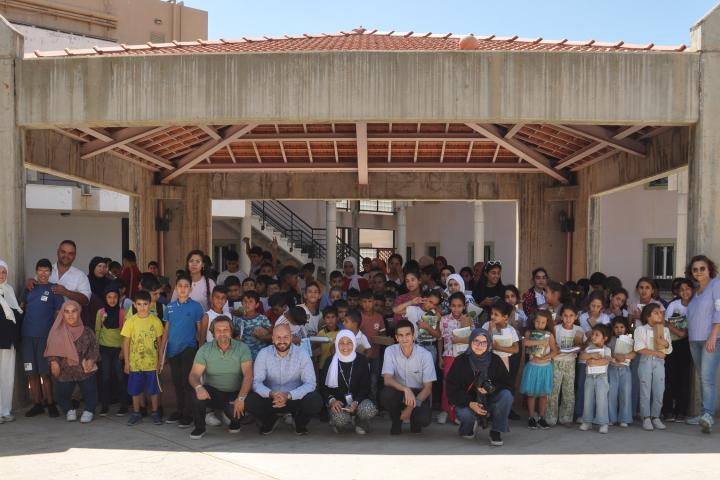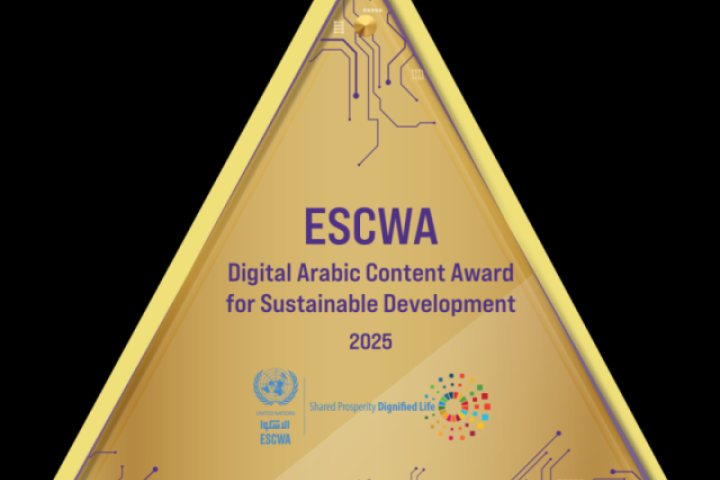News
2 Dec 2016
Beirut, Lebanon
Palestinian Efforts and Achievements in the Climate Change Combat

This statement was made by ESCWA Executive Secretary Rima Khalaf at the event on “Palestinian National Efforts and Main Achievements between Accession to Convention in March 2016 and COP-22,” held on 18 November 2016, and on the sidelines of the twenty-second session of the annual Conference of the Parties (COP 22), which took place in Marrakech, Morocco, between 7 and 18 November 2016.
The event sought to shed light on exceptional achievements done by the State of Palestine in the period between accession to convention on 17 March 2016 and COP22 on different fronts.
“Palestine, like every other country present here, shares the belief in our common future. And like every other country, Palestine is determined to take all necessary action to secure our planet's health. But in many other respects Palestine is like no other country in the world. It is unique in two ways. Palestine is the only country still under the military occupation by another in our post colonial world. And Palestinians are the only people to continue living under the full domination of another in the third Millennium.” ESCWA Executive Secretary said.
ESCWA Executive Secretary concluded by saying, “in the past we have wronged our environment and pushed it to the limits of unsustainability. We woke up to the damage we caused, and we decided to change our trajectory. It is time to right another historic wrong. The Palestinian people cannot continue to be excluded from universal human rights, including the right to self determination. The assault on their lives and dignity must stop, and the occupation must end. Half a century is just too long for any people to languish under the military rule of an occupying power that treats its victims as lesser human beings.”
She added, “An anomaly that not only impedes the ability of Palestinians to protect their children from being killed, maimed or incarcerated by the occupying power, but also their ability to protect their environment from Israeli onslaughts. Israel, today exercises full control over the people’s lives in Palestine. It hampers access by the Palestinians to their own natural resources including land, water and food; as it impedes their access to health and education services.”
Khalaf further noted, “Israel controls all Palestinian water resources in the occupied West Bank. It exploits 85 per cent of them for the benefit of its own citizens and then sells back Palestinians their own water at vastly inflated prices. Under Israeli policy, the share of water available to aPalestinian is less than one sixth the share allocated to an Israeli settler living illegally in the occupied territory. In Gaza, the nine-year Israeli blockade and recurrent military offensives have been even more devastating. In addition to the destruction of homes, and the ruptures to lives and livelihoods, the Israeli offensives left its marks on the environment rendering Palestinians food insecure and largely dependent on humanitarian food aid.”
“Furthermore,” she said “Israel has made the occupied Palestinian territory the dumping ground of its polluting industries. Over 1,000 Israeli industrial facilities have been moved to the occupied West Bank with little, if any, environmental regulation. Those include aluminum, cement, chemical, pesticide and fertilizer plants. They operate on Palestinian land without the consent of Palestinians. Coupled with wastewater from the approximately 250 illegal Israeli settlements, they cause pollution, drive up CO2 emissions and take a heavy toll on people’s health and natural resources, in particular water.”
Khalaf noted that “these daunting conditions, however, did not prevent the Palestinians from action. Their struggle for their environment has now become part and parcel of their struggle for national liberation. Their Climate Change Adaptation Strategy and Programme of Action is one testament to that. Though this programme cannot mitigate all the costs of occupation to their environment, with its focus on food and water security, it demonstrates a courageous step in the right direction. It is worth noting that the direct cost of the Israeli occupation to the State of Palestine was estimated at around $3 billion in 2010, or what is equivalent to 37 per cent of GDP. Environmental damage in terms of air pollution, and agricultural land degradation was estimated at around 3 per cent of GDP. In a recent study, ESCWA estimated the cost of water resource degradation in Palestine at $675 million, or 9.1 per cent of GDP, in 2014.”
“Palestine signed the Paris agreement in April 2016,” she said “and was among the first parties to ratify it. Palestine has also achieved remarkable progress in the areas of climate change adaptation and mitigation. It has proceeded with preparations for implementation of its nationally determined contributions (NDCs), and articulated ambitious plans for combating climate change, including the submission of a readiness programme to the Green Climate Fund.In this, the Palestinian people has reaffirmed its commitment to our common goals and the well being of humanity.”
ESCWA Executive Secretary concluded by saying, “in the past we have wronged our environment and pushed it to the limits of unsustainability. We woke up to the damage we caused, and we decided to change our trajectory. It is time to right another historic wrong. The Palestinian people cannot continue to be excluded from universal human rights, including the right to self determination. The assault on their lives and dignity must stop, and the occupation must end. Half a century is just too long for any people to languish under the military rule of an occupying power that treats its victims as lesser human beings.”
Photo by IISD/ENB | Mike Muzurakis



